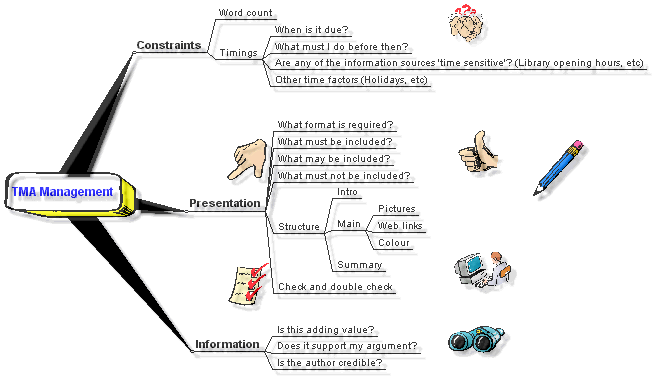Allow
time for postage or problems uploading.

Don't
plan to do everything on Monday only to find the Reference Library is closed!
You may need to speak to a particular person only to find they are not available on Wednesdays.
You may need to speak to a particular person only to find they are not available on Wednesdays.
If
you would like a hard copy of these notes click on the pencil!
Being
able to adequately present your work is often as important as the accuracy
of your argument. Consider - If the marker sees a piece that hasn't been proof
read, is poorly laid out and shows no structure they may are already starting
to doubt the credibility of the work.
Unless
the TMA specifies a different structure you should always include these components.
Remember the old adage that you should "Tell 'em what you are going to tell 'em, tell 'em and then tell 'em what you've told 'em"
Remember the old adage that you should "Tell 'em what you are going to tell 'em, tell 'em and then tell 'em what you've told 'em"
Check
the information you are using actually supports your claims!
Though
classics in their time the side of a cornflakes packet might not be the most
credible reference source in an academic piece about technology. Even if it
is credible check as much as possible. With few exceptions 'the bloke in the
pub said......' is not likely to garner too many marks (If the bloke in the
pub is Dr Russell Stannard and your TMA is in some way related to Physics
you may be okay).
Using
half the word count to restate a small point from different authors or references
may not score many marks.
Again
great work can be spoilt by needless typos or poor grammar. Proof read, see
if someone else can check the grammar (not the content!), use a spell checker
(with caution) but make sure you present your work as well as possible by
looking at these details.
Tell
'em what you've told 'em!
Bring together the strands of your argument and demonstrate how you have achieved the objectives you laid out for yourself in the intro.
Bring together the strands of your argument and demonstrate how you have achieved the objectives you laid out for yourself in the intro.
Tell
'em what you've told 'em!
Bring together the strands of your argument and demonstrate how you have achieved the objectives you laid out for yourself in the intro.
Bring together the strands of your argument and demonstrate how you have achieved the objectives you laid out for yourself in the intro.
Again
for HTML reports - use colour wisely but use it. Take advantage of the medium.
Plain old A4 paper doesn't offer these benefits but HTML does and many courses
require that colour and tables are used to demonstrate that you have grasped
the basics of the medium as well as the course content.
Check
that they actually work and take the reader where you say they go! There are
few things more frustrating than being offered a link to the secret of life,
the universe and everything only to find the link is broken or actually goes
to an online Pizza Palace.
Courses
that use HTML reports offer a great opportunity for using images to explain
points and to 'lift' the layout. Unless specifically instructed not to you
should always use them!
There are some superb images available on the web which can be worth thousands of words.
There are some superb images available on the web which can be worth thousands of words.
This
is where you lay out your well reasoned arguments and support them with well
selected evidence from credible sources.
This
is where you set the scene. Explain to your reader what you are going to discuss
and how (this is particularly important if you are using a particular convention
such as using a separate page for references). You should also try and explain how you'll structure your argument.
Tell your audience what you intend to tell them!
Tell your audience what you intend to tell them!
Sometimes
certain things are strictly not allowed, for instance submitting Bill Gates
with your essay about Operating Systems may be frowned upon - again you should
check if you are in doubt.
Anything
else that might help you support your work - If it's not specifically stated
as "Not allowed" check with your tutor. Who knows a real elephant
attached may be worth extra marks!
Probably
your name and PI, maybe the question restated, maybe a table of data, certainly
references and citations, maybe a picture of someone or something.
HTML?
RTF? Word document? Hand carved on tablets of stone? Check what format your
submission should take and ensure that you follow the requirement. If you
are asked for an rtf file and submit a Word document your tutor may not even
be able to open it.
Your
holidays, tutor holidays, Bank Holidays, any equipment you need being unavailable
for any reason, children being on holiday which means you can't work, family
visiting from Canada, etc.
Being late is only okay if you get permission from your tutor first.
Before you ask for an extension weigh up the likely effects and benefits. Will an additional week push back studying the next part of the course? Will it delay later TMAs? Will you score substantially more by taking more time on the TMA?